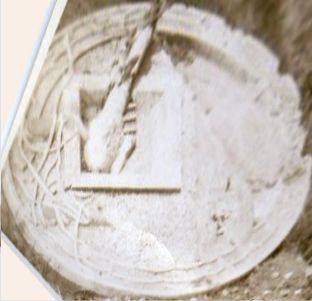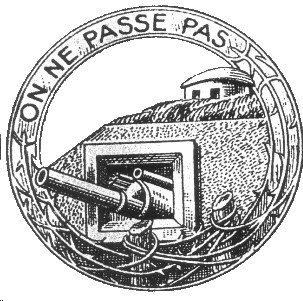My first ideas about the mystery Thing: The lines look like Jugendstil ornamentations. If it is, the object would be made at the turn of the century and not Military, perhaps a decoration of a public building, a station? And if it is a Jugendstil object, it might have been in France or Germany, but probably not in Iceland. Christoph
|
21st and 824th Engineer battalions
|
|
06-03-2013, 05:20 PM
06-03-2013, 06:32 PM
Oh I know it wasn't in Iceland... it was in his European photo box.. one of the loose photos he never got into an album or did descriptions of
06-03-2013, 07:08 PM
I have deskewed the photo, but... The Thing in the middle could be a hand grenade, a horn of plenty or a bread in the oven?
Christoph
06-03-2013, 07:21 PM
My friend from Germany had another thought...
Marion J Chard
Proud Daughter of Walter (Monday) Poniedzialek 540th Engineer Combat Regiment, 2833rd Bn, H&S Co, 4th Platoon There's "No Bridge Too Far"
06-03-2013, 07:22 PM
No, not here. Use the entry key all the time and it simply takes me to next line.
Marion J Chard
Proud Daughter of Walter (Monday) Poniedzialek 540th Engineer Combat Regiment, 2833rd Bn, H&S Co, 4th Platoon There's "No Bridge Too Far"
06-03-2013, 07:39 PM
quote: "It doesn't work in the WYSIWYG mode" Neither do i
but enter key works just fine
Definitely not a mortar base, it`s way to big. If you look close at the first pic, at the top center there is a soldier crouching down and another guy standing to the left. Like i said in previous post it`s about 6 feet in diameter. The angle of the photo problably made it look oval. I think it`s a building or garden ornament.
06-05-2013, 02:24 AM
The mystery thing shows the sign of the French Maginot line. A member of another forum found the solution (the same forum who found the church in Manila). As this sign is found very often I cannot believe we'll also find the exact place where it was, but in France. Christoph
Edit: Should read before writing: If he was at Mortefontaine near the Magionot line, maybe we will find the place.
06-05-2013, 06:00 AM
Larry,
I dug around in both Scott's and Taggart's AAR's through their divisional histories and even my 30th regimental history... yet not one word about the bridge or ever going to Heidelburg. According to the maps showing their axis of advance, Heidelburg was WAY outside of it. WAY south of their line of advance by, I'd guess 20 to 40 miles... something like that.
The 3rd advanced across the Rhine at Worms, Germany, on the 15th of March, and arrived at Worth, Germany on the evening of the 29th advancing through Heppenheim.
The 3rd at the time was assigned to the XV Corps. 6th Army Group. They moved in the direction of Wurzburg, Germany. VI Corps. containing the 14th Armored, 36th ID and 70th ID... moved through the Heidelburg area around the 29th of March. The 3rd was with the VI Corps. for the majority of the war but, not at the time of the Rhine Crossing and their drive into Germany.
Regards, MARNE
06-05-2013, 08:05 PM
Mystery Thing again: Is it possible it was not Mortefontaine but Morfontaine? It seems as if there are three Mortefontaines in France, but all in the Center and not near the Maginot line. Then it may have been at the Camp de Morfontaine of the 139e Régiment d'Infanterie de Forteresse / Colonel Ritter. You'll find some Pictures of Morfontaine and the Maginot line here http://lostimagesofww2.com/photos/places/morfontaine.php, both today and in 1944. Christoph
06-05-2013, 08:25 PM
I didn't know the Maginot line had signs. People say the ML didn't work but it did. The Germans didn't put a lot of effort into breeching it - they just went around it. Unfortunately for the French, they didn't think the Germans would go through Belgium (again).
Incidentally, what is the translation of "On ne passe pas"? Google translate said "We do not pass", but that made less sense than something like "They will not pass". |
|
« Next Oldest | Next Newest »
|
Users browsing this thread: 1 Guest(s)






